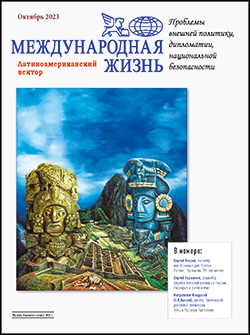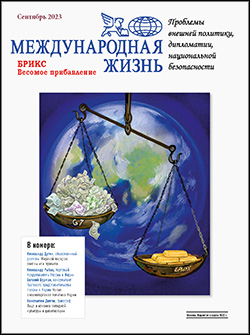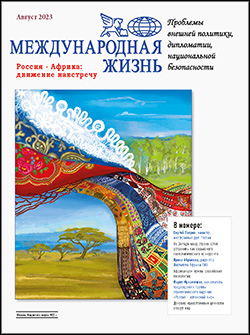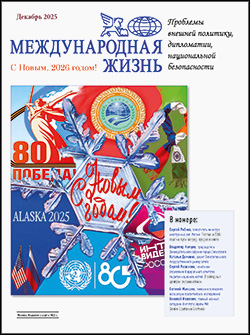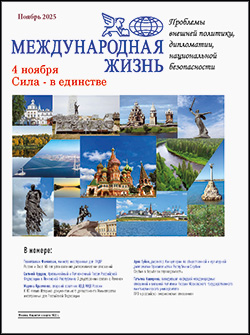DIPLOMACY
Bocharnikov М., Russia–Kazakhstan: diplomatic relations and partnership a quarter of a century long
The 22 of October, 1992 – the date of signing of the Protocol of Exchange of Plenipotentiary Representations between the Federation of Russia and Kazakhstan that gave start to the history of diplomatic relations of the two countries as friendly sovereign states. These relations withstood a trial of time and have turned by now an example of a strategic partnership in the modern period.
POLITICS
Astakhov Е., The Latin American “near abroad” of the USA with Donald Trump’s administration
Since the beginning of 1980-th Latin and Caribbean America began its entering into the globalization process including the orbit of a network economy and information society. The countries of this region have lately begun getting rid of satellite mentality and react to changes in the display of forces at the international stage. Growing economic capacity makes it possible for Latin Americans to consolidate their political and economical autonomy in the relation to the USA.
Gavrilova S, Failed “Third Republic in Italy”
An attempt of the government to carry out a constitutional reform with the purpose to change the face of Italy has failed. The threat of political instability in Italian Republic of today in the context of a high integrity level in the economy and political system of European countries actually makes a durability of European Union in the whole subject to questioning.
Pogodina V., Minsk process for Ukrainian settlement: a round dance of priorities
Germany and France are, from one side, the guarantors for fulfillment of Minsk agreements, i.e. they jointly compromise with Russia as the third guarantor to contribute to the Ukrainian settlement by any feasible means, and from the other side, they stand for geopolitical priorities of the West which are far from totally coinciding with the priorities of the Ukrainian settlement and this might be a reason why Minsk process is going by twists and turns.
Marcelo Bezerra, Canada: Justin Trudeau’s non-trudeauist foreign policy
After Justin Trudeau’s two years term as the Prime Minister, an analysis of the Government’s foreign policy however looks like more a conservative foreign policy characterized by some tight links with the foreign policy of the USA and Israel then the one of the Government of his liberal predecessor that condemned the unilateral military invasion of Iraq by the USA and Great Britain in 2003.
Platoshkin N., “Jamaica” in Bundestag?
At the parliament elections held in Germany on the 24 of September this year, the German political heavyweighs, the Christian Democratic Union and Social Democratic Party of Germany, suffered the most overwhelming defeat in their history having just 33 and 21 per cent of votes respectively. The Christian Democrats haven’t had such a low result since 1949 and the number of votes won by the Social Democrats have been less than they had won under the Keiser, in 1913.
JUBILEUM
Congratulation to Piydishev B.D. on his 85-th anniversary
TRENDS
Solovyov E., “Trumpism” and international relations: is the world on the threshold of deideologization?
Dominance of the liberal paradigm on a global scale gradually comes to its end alongside with termination of “unipolar moment” in the world politics and forming of polycentrism. Donald Trump’s victory at the president elections probably is going to kick-start erosion of the liberal ideological consensus in the Western countries. As a result there are emerging preconditions for a long-term deideologization of the international relations and strengthening of political realism as an intellectual dominant in the process of decision-making in dynamic and much more undetermined international environment.
Veduta Е., Digital economy will lead to economic cyber-system.
The global crisis manifesting itself through a growing chaos originates problems unknown to the civilization in the past. The crisis problem can’t be resolved in a conventional way implying a global military action. Exportation of social experiments leads to dramatic consequences, to social degradation. An indispensable tool for solution of common world problems would be implementation of the digital economy making it possible to use informational technologies with the purpose of higher efficiency of management decisions. There exist two completely different attitudes towards the creation of the digital economy.
HALLMARKS OF HISTORY
Е.Сергеев. “Ambassadors’ plot” against Soviet Russia in 1918: new interpretation of “the British trail”
In autumn of 1918 the leaders of the Entente planning to remove Bolsheviks from power considered as the last resort a coup d’etat after the event named “Ambassadors’ Plot” or “Lockhart’s Plot” by Soviet public officials and by the press.
Puk B., Prince Alex B. Lobanov-Rostovski and strengthening of the role of Russia in the Far East
Prince Alex Lobanov-Rostovski certainly was one of the most outstanding Russian statesmen directing the Ministry of Foreign Affairs. With just 35 years of age he was sent to Constantinople as a special envoy and plenipotentiary minister and then served as an Extraordinary and Plenipotentiary Ambassador in Constantinople, London and Vienna. On the 26 of February (10 of March) 1895 he was summoned by the Czar Nicholas II to hold the post of Minister of Foreign Affairs.
LIBRARY
Akopov P., “It’s better ten years of negotiation then a single day of war”
Surguladze V., Strategic deadlocks at the Middle East direction of the USA foreign policy and a passive balance of American “soft power” in the region.
Sokolov V., Islamophobia as a threat to international and national security
Shubin S., A new book on the Arctic
Rudov G., Well-timed enlightenments
in memoriam
In memory of Andrei A. Gromyko
Читайте другие материалы журнала «Международная жизнь» на нашем канале Яндекс.Дзен.
Подписывайтесь на наш Telegram – канал: https://t.me/interaffairs

 21:48 25.10.2017 •
21:48 25.10.2017 • 